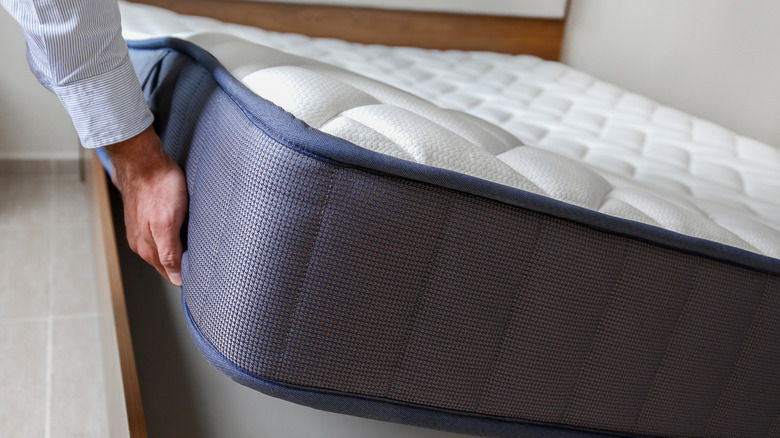This Is What Happens When You Sleep On A Bad Mattress
If you find yourself waking up in the morning groaning with lower back pain, your mattress may be to blame. While physical pain is one of the more obvious indicators of a mattress that may be past its expiration date, there are some other more subtle indicators that you may never have expected could be related to sleeping on a bad mattress.
As reported by Statista, in 2007, Americans reported replacing their mattress an average of every 10 years. This number has since dropped, with 2016 reports indicating an average mattress replacement time of just shy of every 9 years. Depending on the type of mattress, a decent lifespan may be around eight to ten years (via Tech Radar). However, many factors can either shorten or lengthen this timeframe. For example, researchers have determined that the lower the quality of parts used in the construction of cheaper mattresses, the higher the chances of structural failures (via Mid Hudson News).
Let's take a look at some of the signs of a bad mattress and in what ways they affect the human body.
How to prolong the lifespan of your mattress
According to Sleep Advisor, some telltale signs of a bad mattress include breakouts, congestion, grogginess, and difficulty falling asleep. According to a 2015 sleep study, if it takes a long time to drift off to dreamland, it may be due to an overly firm mattress. Additionally, if you find you're struggling to get in the mood with your partner, it may be time for a new mattress, because not getting enough sleep can lead to a lower sex drive (via Prevention).
Signs of a bad mattress can also be right in the mattress itself. A mattress that's ripped, worn down, or turning yellow is due for a change (via Tech Radar). If your mattress is looking particularly rough and you find yourself waking up with sinus congestion, these can be signs of dust mite or bacterial contamination. As many as 10 million dust mites can be found inhabiting your mattress, per Sleep Advisor.
To get the most out of your mattress, Tech Radar suggests ways to prolong its lifespan. Routine flipping and rotating of the mattress will ensure you're getting even body support in the long run. In addition, regularly vacuuming your mattress as well as exposing it to sunlight can help rid it of contaminants. If you're particularly prone to night sweats, consider using a mattress protector. Otherwise, a sprinkling of baking soda may do the trick by absorbing any moisture held in the mattress.


